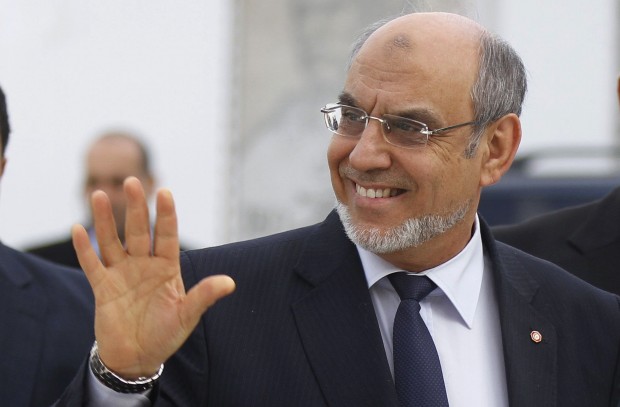
Tunisian Prime Minister Hamadi Jebali arrives for a round of consultations with other political parties at the Carthage Palace in Tunis, February 15, 2013. (REUTERS/Anis Mili)
Tunis, Asharq Al-Awsat—Tunisian Prime Minister Hamadi Jebali said yesterday that plans to form non-partisan cabinet to tackle the current political turmoil Tunisia is facing have failed.
“I say in all clarity that the initiative I presented—that is to say, a government composed of members not belonging to any political parties—failed to reach a consensus,” Jebali said after talks with party leaders.
“Another form of government” was still a possibility, he added.
Tunisia was pitched into crisis last week after leading secular opposition politician Chokri Belaid was gunned down outside his home in Tunis, touching off mass protests targeting in part the ruling moderate Islamist party.
Jebali’s own Ennahda party rejected his idea of a technocratic government.
Ennahda party chief Rached Ghannouchi told the Reuters news agency that it was essential that Islamists and secular parties shared power now and in the future. “Any stable rule in Tunisia needs a moderate Islamist-secular coalition,” he said.
Ghannouchi said Ennahda might compromise over control of portfolios such as defence, foreign affairs, justice and interior. “We are ready to discuss all ministries, including sovereign ones, in a new coalition government.”
Jebali first proposed his initiative in the wake of public outrage over the broad daylight killing, which came after months of failure by the ruling coalition to overhaul the government, and laid bare divisions within Ennahda.
The murder also enflamed simmering tensions between liberals and Islamists in the once proudly secular Muslim nation, with Belaid’s family accusing Ennahda of his assassination, a charge the Islamists strongly denied.
As well as the row over the new government, there is deadlock over the drafting of the constitution, with parliament divided over the nature of Tunisia’s future political system 15 months after it was elected.
Tunisia’s political transition has been more peaceful than those in other Arab nations such as Egypt, Libya and Syria. But tensions are smoldering between Islamists elected to power and liberals who fear the loss of hard-won liberties.
